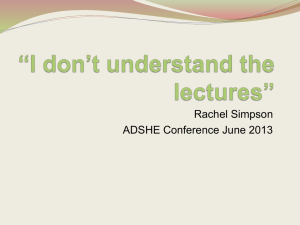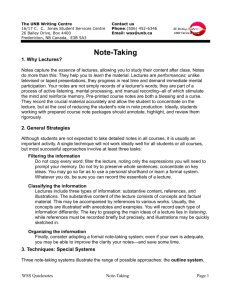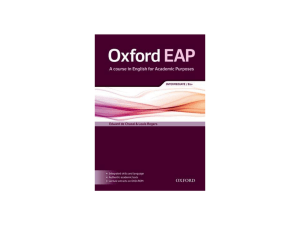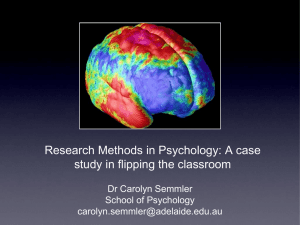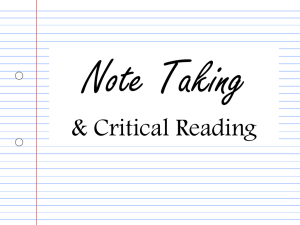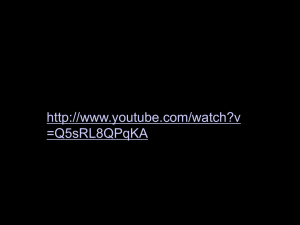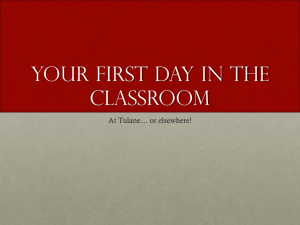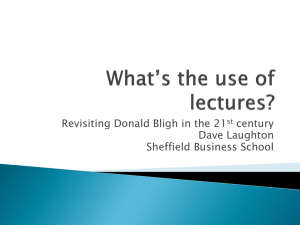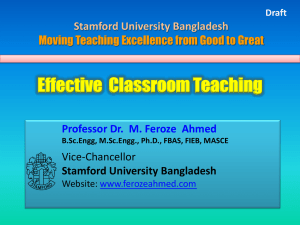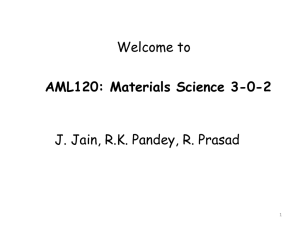Being an international student
advertisement
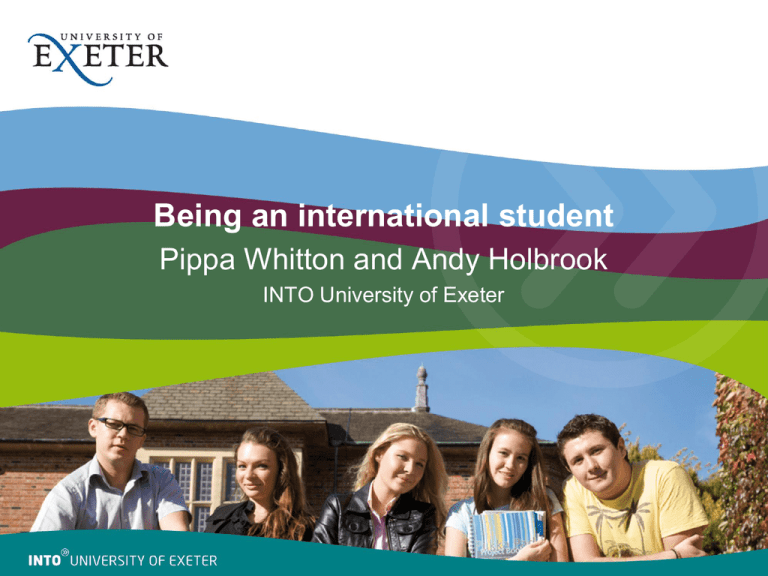
Being an international student Pippa Whitton and Andy Holbrook INTO University of Exeter Foundation → meeting needs of students studying at university? Research question How closely and effectively aligned is the teaching in INTO with the needs of our students going to study as undergraduates in Exeter University? Context • Baleap (‘the global forum for EAP professionals’) tracking project • ≈ 400 Foundation students → 60-70% UoE Questionnaires 1st & 2nd year Foundation Student experience Tutor perspective Focus groups / interviews 1st - 3rd year INTO → University of Exeter Questionnaire Dec 2011 (open Qs) Useful, not useful, gaps (on Foundation): Various skills - esp RSS and WTG (useful) Very varied – WTG, novels, culture (gaps) Differences/challenges (at university): 1st year – independent study reading lectures 2nd year – similar + writing essays Comments Useful: ‘Referencing Conventions gave us a head start compared to the English students. As it meant that we were not worried about plagiarising.’ 1st year ‘Reading and note-taking - we have lots of reading to do when writing an essay’ 2nd year Not useful: ‘Note taking because my subject do not need it…’ 1st year Gaps: ‘discussion rather than oral presentation for exam’ 1st year Questionnaire March 2012: Useful (17 x 1st yr) Questionnaire March 2012: Useful (12 x 2nd yr) Quest March 2012: not useful (11 x 1st yr) Quest March 2012: not useful (7 x 2nd yr) Comments: Foundation Useful 1st year - not challenged (one st) Not useful 1st year - emphasis on ‘formalized’ writing (one st) Gaps 1st year – time mgt, note-taking prep for lectures, gp work 2nd year – writing, group work, searching for sources Comments: at university Differences: 1st year - more indep’ study/less like school (±), harder (one st ‘less pressure’?), more reading 2nd year – more self-study, less T-st interaction, group work, more stressful Challenges: 1st year – language, self-study/control, referencing 2nd year - time management, understanding articles & lectures Developments on Foundation English • More explicit & staged approach to developing skills: note-taking & paraphrasing/summarising referencing critical thinking independent learning • More collaborative work (group presentations, seminars) Semi-structured – focus groups of 2-4 • Could tell us about the main challenges you have faced studying at university? • In what ways do you think the Foundation course prepared you for university well? • In what ways could the Foundation course have prepared you better? • What are the main differences between studying on the Foundation course and in the University. Focus groups threw up many of the same challenges in university studies already mentioned: • Time management • Lectures • Reading • Exams Focus groups also mentioned • • • • Integration with native speaker students Personal tutorials Team-based presentations and essays Assessment In general • the same issues that many younger undergraduate students have? – Transition to a much less supportive learning environment – Dealing with very large amounts of reading – Managing time for independent learning – Increasing levels of personal critical response – Effective, advance preparation for lectures, seminars and tutorials – Team-working skills – Writing well structured academic essays Good practice • Putting lecture recordings and power points on to ELE. (power points a week or two in advance). • Working on the development of team-working skills • Supporting effective time-management strategies • Supporting good study skills through ELE • Supportive personal tutorial system • Providing a manageable single text in advance of lectures • Audited reading lists • The ‘global chum’ initiative Good practice (cont) • Ensuring International students have adequate representation on SSLCs • Joining university societies • Actively encouraging students to participate in study groups • Using the opportunity for multi-cultural exchange in a positive way. Implications for INTO • Need to look at our CPD – More general awareness of academic culture in staff – Greater understanding of blended learning techniques – Greater understanding of how to instil criticality • Need to look at our courses – More on team-working – More on study skills and time management – Promote greater awareness of the demands of university Other issues • Quantity & type of reading • Level of support

